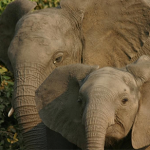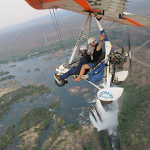We were so sorry to hear about the fire that gutted the arrivals hall at Nairobi’s International Airport early on August 7, 2013. Luckily no one was hurt, but the damage was extensive and it occurred right at the height of the tourist season in Kenya as the Great Migration is in full swing. Some of our clients could not fly into Nairobi on their scheduled dates, and others had to extend their vacation by a few days, as they were unable to leave. The Kenya Airport Authorities were quick to act, and just a few days on, the flights have returned to schedule, and everything is running smoothly again.
The disruption caused by a random incident like this can obviously ruin the best laid plans for a wonderful safari. But there are certain lessons to be learned from this fire that we would like to highlight for you. So if a disruptive event ever occurs that impacts your trip, you will hopefully will be in a position to make the best of it and not have it ruin your safari, but merely adapt and change the course of your safari.
Lessons Learned …
 Insurance — At African Portfolio we automatically sign up our clients for basic insurance coverage because you never know. It is always better to be safe than sorry. As safaris are generally planned so far in advance, there are many factors that could come into play where you have to switch dates around, or change your best laid safari plans. Trip cancellation/interruption are essential components of a good travel insurance policy, and much needed during this recent incident where clients had to book extra nights at hotels, or re-book flights. A good tip to note here is to call the insurance company and find out what hotels they would prefer you to re-book and what the procedure is in order to get the refunds promised in the policy. Extending your stay at a high-end hotel may not be covered by your policy if they have a preferred hotel chain that is less expensive. Click here for more information about insuring your safari …
Insurance — At African Portfolio we automatically sign up our clients for basic insurance coverage because you never know. It is always better to be safe than sorry. As safaris are generally planned so far in advance, there are many factors that could come into play where you have to switch dates around, or change your best laid safari plans. Trip cancellation/interruption are essential components of a good travel insurance policy, and much needed during this recent incident where clients had to book extra nights at hotels, or re-book flights. A good tip to note here is to call the insurance company and find out what hotels they would prefer you to re-book and what the procedure is in order to get the refunds promised in the policy. Extending your stay at a high-end hotel may not be covered by your policy if they have a preferred hotel chain that is less expensive. Click here for more information about insuring your safari …
Let The Experts Book Your Entire Safari — Planning a safari is a collaborative project, we always welcome our clients input. But when it comes to booking camps, flights and transfers, it’s a really good idea to have us (or any qualified tour operator) take care of your trip from beginning to end. This is not because we want ultimate control, or that we don’t trust your judgement, it’s because if something goes wrong along the way, we have the contacts to make it right. Safaris are made up of lots of connecting pieces, and if one segment gets delayed, there’s a domino effect that is difficult to manage unless you have lots of experience. Because we have excellent contacts with the ground operators at all the destinations we sell, we can quickly ensure our clients are re-booked and able to catch up with their safari itineraries, or extend their trips, if there’s a delay like the one caused by the fire at JKIA.
Use an Experienced Tour Operator — This follows on a little from our point above. We have stayed at almost every camp we sell, we’ve traveled many miles on the roads between camps throughout East and Southern Africa, and we’ve probably flown every internal flight on offer in those countries as well. So we know if you happen to miss your flight from Nairobi to Amboseli, that it may make sense to drive that distance, rather than wait 5 hours for the next flight. But if you missed your flight from Nairobi to the Mara — then we would suggest lunch in Karen and to wait for the next available flight as a road transfer would take much longer given that the roads are in much worse shape. But if you book a safari with an agent that does not have this type of insider knowledge you could be in for a rough ride, which would make the whole experience of missing a flight, that much more disappointing.
 Book your airfare with African Portfolio or the airline directly (for those wanting to use miles) — We often book our clients airfare as a courtesy and in the case where there is an incident like the JKIA fire, it’s much easier for us to call the airline and figure out a plan, than it would be if you had booked your airfare through an online travel web site. Imagine trying to speak to a person at “Cheaptickets” or “Kayak” from rural Tanzania if you find out your flight has been cancelled due to a random event. It is much more efficient to either call the airline directly, or have us monitor the situation for you and take care of it.
Book your airfare with African Portfolio or the airline directly (for those wanting to use miles) — We often book our clients airfare as a courtesy and in the case where there is an incident like the JKIA fire, it’s much easier for us to call the airline and figure out a plan, than it would be if you had booked your airfare through an online travel web site. Imagine trying to speak to a person at “Cheaptickets” or “Kayak” from rural Tanzania if you find out your flight has been cancelled due to a random event. It is much more efficient to either call the airline directly, or have us monitor the situation for you and take care of it.
Thankfully, incidents like the JKIA fire are rare and unlikely to happen while you are on safari. But it’s good to keep in mind why we have certain safety nets in place. They make a bad situation so much better!